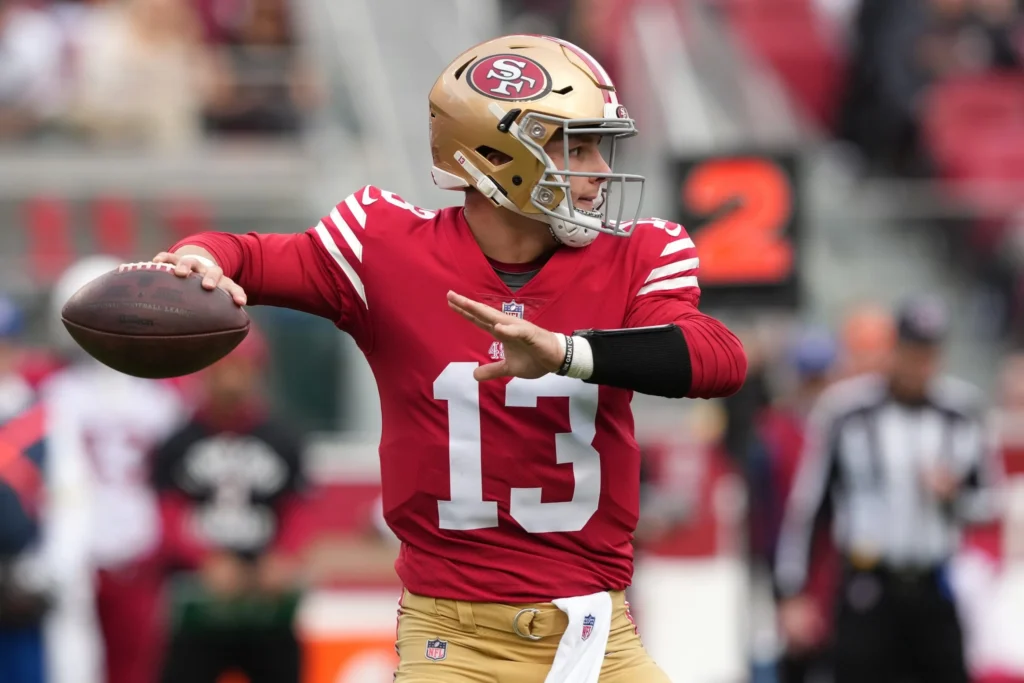The world of college football is abuzz with speculation and excitement as star quarterback Brock Purdy signs a groundbreaking contract with his team. In this article, we delve into the details of Brock Purdy’s contract and its potential implications for college football, exploring its significance for players, teams, and the broader landscape of collegiate athletics.
1. The Rise of Brock Purdy:
Brock Purdy has emerged as one of the most promising quarterbacks in college football, captivating fans with his talent, leadership, and determination. Hailing from Gilbert, Arizona, Purdy made a name for himself at Iowa State University, where he quickly established himself as a dynamic playmaker on the field. With impressive stats and clutch performances, Purdy garnered attention from NFL scouts and earned accolades from college football pundits. His rise to prominence has not only elevated Iowa State’s football program but also positioned Purdy as a future star in the sport.
2. The Evolution of College Football Contracts:
Traditionally, college football players have not been compensated beyond scholarships and stipends due to NCAA regulations prohibiting athletes from profiting off their likeness or endorsements. However, recent changes in NCAA policies and state legislation have opened the door for athletes to capitalize on their name, image, and likeness (NIL) rights. As a result, college football contracts, once reserved for professional athletes, are now becoming a reality for top-tier collegiate talents like Brock Purdy. This shift marks a significant departure from the status quo and has the potential to reshape the landscape of college athletics.
3. The Terms of Brock Purdy’s Contract:
Details of Brock Purdy’s contract are closely guarded, but reports suggest that it includes lucrative incentives and endorsement opportunities previously unavailable to college athletes. Purdy’s contract likely encompasses various elements, including compensation for appearances, endorsements, and licensing agreements. Additionally, performance-based incentives tied to on-field achievements such as touchdowns, passing yards, and team success may also be included. The specifics of Purdy’s contract reflect the changing dynamics of college sports and the increasing commercialization of collegiate athletics.
4. Implications for College Athletes:
Brock Purdy’s contract signifies a new era for college athletes, empowering them to capitalize on their talents and monetize their brand while still in school. For years, student-athletes have been advocating for greater rights and financial compensation, arguing that they generate significant revenue for their universities and the NCAA through ticket sales, television contracts, and merchandise sales. Purdy’s contract sets a precedent for other athletes to negotiate similar deals and assert their value in the marketplace. By leveraging their NIL rights, college athletes can now pursue endorsement deals, sponsorships, and other opportunities previously off-limits, providing them with financial security and recognition for their contributions to the sport.
5. Impact on College Football Programs:
Brock Purdy’s contract has implications not only for individual athletes but also for college football programs and institutions. Schools with successful football programs may have a competitive advantage in recruiting top talent, as athletes seek opportunities to maximize their earning potential and exposure. Additionally, schools may need to adapt their recruiting strategies and scholarship offerings to remain competitive in a landscape where athletes have newfound leverage in contract negotiations. Furthermore, the financial implications of NIL contracts on athletic department budgets and revenue-sharing agreements with student-athletes may require schools to reassess their financial models and explore new revenue streams.
6. Challenges and Considerations:
While Brock Purdy’s contract represents a significant milestone for college athletes, it also raises important questions and considerations. The commercialization of college sports and the potential for unequal compensation among athletes could exacerbate existing disparities within collegiate athletics. Additionally, navigating the complexities of NIL rights, endorsements, and contracts may present challenges for student-athletes, who must balance their academic and athletic commitments while managing their newfound financial opportunities. Moreover, the impact of NIL contracts on amateurism and the integrity of college sports remains a subject of debate, with proponents and critics offering divergent perspectives on the implications of compensating student-athletes.
7. The Future of College Athletics:
As Brock Purdy’s contract reverberates throughout the world of college football, its long-term implications for the future of college athletics remain uncertain. While the immediate impact may be felt in recruiting, branding, and revenue generation, the broader implications of NIL rights and athlete compensation have yet to fully materialize. Moving forward, stakeholders in college sports, including universities, athletic conferences, and governing bodies, must navigate the evolving landscape of NIL regulations and seek to balance the interests of athletes, institutions, and the integrity of the sport. Ultimately, the legacy of Brock Purdy’s contract will be measured not only in financial terms but also in its impact on the rights, opportunities, and experiences of college athletes for generations to come.
Conclusion: Brock Purdy’s Contract and the Future of Iowa State Football
In conclusion, Brock Purdy’s contract extension signifies a significant commitment from Iowa State University to its football program and its aspirations for success in the highly competitive landscape of college football. The decision to extend Purdy’s contract reflects the confidence that the coaching staff and administration have in his abilities as a quarterback and leader both on and off the field. Additionally, it underscores the importance of continuity and stability within the program, as Purdy’s tenure as the starting quarterback provides a foundation for sustained success.
Purdy’s contract extension also has broader implications for the future of Iowa State football and its standing within the Big 12 Conference and nationally. With Purdy at the helm, the Cyclones have emerged as a formidable contender in the conference, challenging traditional powerhouses and garnering attention on the national stage. His continued presence on the team ensures that Iowa State remains a competitive force in the years to come, with the potential to vie for conference championships and prestigious bowl game appearances.
Read Also: The Phenomenon of Kylie Jenner Exploring the Rise of a Cultural Icon

